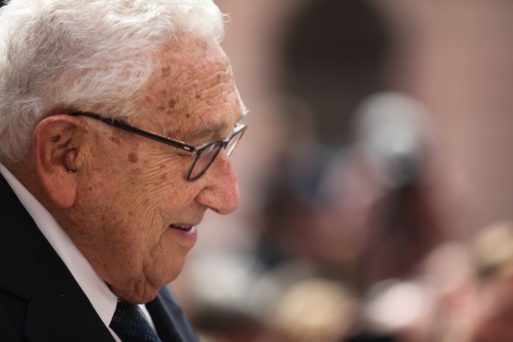
Former Secretary of State Henry Kissinger was notable for many things, including his remarkable longevity.
Credit: Flickr
Henry Kissinger was still advising world leaders on how to deal with existential challenges when he died last November at the age of 100. Sharp and productive to the end, the former secretary of state could be the poster child for the health benefits of working past 65.
A 2023 study by the Pew Research Center found that the number of people working beyond the traditional retirement age has doubled in the last 35 years. That accounts for 19 percent of Americans 65 or older. And according to studies investigating this phenomenon, many of those workers may be living longer because of it.
A 15-year study of 83,000 older adults published in the Centers for Disease Control journal, Preventing Chronic Disease, in 2015 found that people who worked past 65 were three times more likely to state they were in good health. They were half as likely to have cancer, heart disease, and other major health problems, compared to those who had retired.
A study published in 2016 in the Journal of Epidemiology and Community Health, which tracked around 3,000 subjects over an 18-year period, determined that working just one more year beyond 65 reduced a person’s mortality rate by 9 to 11 percent, regardless of health.
Research focusing on cognitive health that appeared in The Lancet noted that countries with early retirement ages reported higher rates of dementia.
These studies cite ongoing social engagement, a sense of purpose, and mental stimulation provided by work as possible key factors contributing to better health and longevity.

Credit: RDNE Stock project
Not Everyone will Benefit
The caveat is that working after 65 is not healthy if the job is stressful. Hanging onto a job you don’t like will do more harm than good. Researchers are finding that college-educated workers in satisfying jobs tend to benefit from extended work years, while people in grinding, low-paying jobs do not, especially if the work is physically demanding or hazardous.
In fact, despite the positive stats in some key studies, most researchers curb their enthusiasm when it comes to their conclusions. For example, in 2021 BMC Public Health published a systematic review of health outcomes resulting from extended work lives. After reviewing 17 relevant studies it found “evidence of beneficial or neutral effects” on overall health, but mixed effects on mental health. Men appeared to benefit the most, as well as individuals working in part-time jobs.

Credit: Centre for Ageing Better
Part-time May Be the Prime Time
Research indicates that part-time employment or freelance work could be the most beneficial option. Older adults who work part time after retirement enjoy the same health benefits with a more flexible lifestyle. The cognitive benefits are multiplied when the part-time job is different from what they did during their full-time career. That requires learning something new, which is a key to maintaining a sharp mind and staving off dementia.
A part-time gig after 65 also provides the chance to meet new people and potentially create a broader social circle, which researchers cite repeatedly as one of the essential components of a long, happy, healthy life.

 Working Past 65 May Extend Your Life
Working Past 65 May Extend Your Life


 How Dare You Die Now!
How Dare You Die Now!

 “Help Me, Helen”
“Help Me, Helen”














